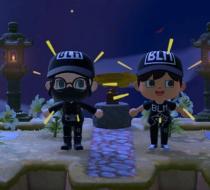Black Lives Matter meets Animal Crossing: how protesters take their activism into video games 1 Favorite
s street protests against anti-black racism erupted across the globe, Animal Crossing: New Horizons players were taking their own stand. Adelle, a software engineer from New York, decided to create a memorial on her in-game island, decorated with flowers and pixel art portraits of George Floyd, Breonna Taylor and other black victims of police brutality.
“I was living with immuno-compromised people, so couldn’t attend the physical protests,” explains Adelle. The virtual space she created soon turned into a protest site as other players – some wearing masks – visited Adelle’s island, shouting: “No justice, no peace”, “Justice for Breonna” and “Defund the police.” “Being there with other players you don’t know, connected by this common feeling, was really moving,” she recalls. While the game only allows eight players on an island at one time, more people were engaging with the protest and raising thousands of dollars via the live-streaming platform Twitch.
Adelle’s demonstration is just one of a spate of Black Lives Matter protests that took place in Animal Crossing and other video games such as World of Warcraft, Splatoon, ToonTown, Grand Theft Auto, and NBA 2K20. In The Sims, a BLM rally hosted by Ebonix (as her avatar is known) was attended by at least 200 players. “The community response was astounding. It felt like a real turning point,” she says.
These in-game protests stand in contrast with the gaming industry’s relatively subdued response to BLM. While a handful of companies pledged substantial donations, displays of solidarity largely consisted of vague social media posts, a few delayed events and releases, and perfunctory in-game gestures. Developers at Epic Games removed police cars from Fortnite, prompting some Twitter users to mock-congratulate them on successfully ending racism.
Ebonix says that the $1m donation from The Sims’ developer, EA, was a “step in the right direction”, but hopes it isn’t just a one-off gesture. “Ensuring that racial injustice is challenged needs to become an integral part of their company [policy].”
That most big developers have failed to seize this moment to tackle the systemic racism of which the industry has been accused has angered some players. There is a lack of diversity among senior figures at gaming companies, and this is mirrored by limited in-game representation of people of colour. Several studies indicate that African Americans, Latinx and Asians are more active in the gaming community than their white counterparts - and yet World of Warcraft had been live for 15 years before developer Blizzard added more diverse hairstyles and facial features to complement the skin-tone options in the game’s character creator.
These are issues that gamers have been fighting to change for years. But with the pandemic complicating physical demonstrations, in-game protests have been steadily on the rise. Ebonix – who is immuno-compromised herself – says she was taking into consideration those unable to attend a physical rally, by “giving them a platform and an opportunity to be virtual activists”.Even before the pandemic, protests had been storming video games for well over a decade. In one, dating back to 2006, a gamer typed the names of soldiers who had died in Iraq into America’s Army for other players to see. Second Life, in particular, has hosted a great deal of political activism, and in 2016, BLM protesters took to The Sims’ virtual streets.
What is different now, according to Nick Robinson, an associate professor in politics and international studies at the University of Leeds, is that the “interrelationship with other technologies is more acute”. Images of in-game protests are widely disseminated, and with Animal Crossing in particular, “the game’s aesthetics lend themselves well to being shared on social media”, Robinson says.
Gabriela Richard, an assistant professor of learning, design and technology at Penn State, agrees, saying that “games have become a more widely consumed entertainment medium than before the pandemic”. The upsurge of platforms such as Twitch has mean that even non-players can watch streams of games, which “offers them a window into what happens when people play games. It’s been a wider awakening to the public,” she says.
Whether or not game developers welcome these demonstrations is a different story. Ebonix says that The Sims creators supported her rally, even retweeting a post she made about the march. But as Robinson points out: “When developers have to make hard and fast decisions about what they do or don’t take down, it can enter into murky territory.” Earlier this month, a World of Warcraft player, Maurice Reimann, was penalised for asking other players to say “trans rights” as a way of screening gamers who wanted to join them on raids.
After contacting the game’s customer service department, Reimann says they were told to “avoid discussing politics in this communication channel”. Reimann accused the game of hypocrisy, noting that they were told this on the same day that Blizzard delivered a livestream in support of BLM.
It isn’t just developers who are resistant to the idea of politics infiltrating their escapist fantasy worlds; many players are, too. Adelle was told on Twitter that: ‘This is just a game, it isn’t a tool for protest,’ and Ebonix says she often encounters Sims players who want to keep politics out of the game. Although, as Ebonix says: “BLM isn’t politics. It’s human rights.”
“Animal Crossing and other platforms like it serve as forms of escapism, which is great, except when real human life and dignity are at stake,” says Kat*, who organised another virtual BLM protest on her island. “Human beings suffering from systemic racism and violence don’t get the privilege of escaping from this reality, and neither should anyone else.”








